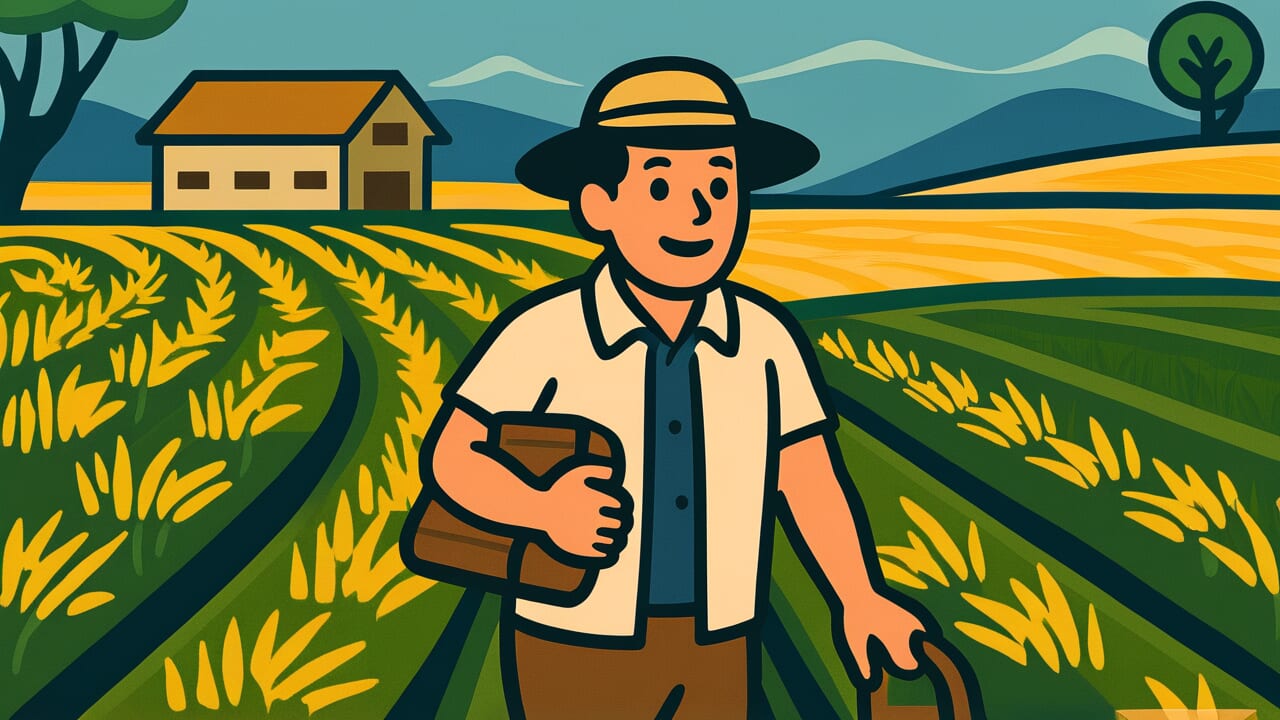How to Read “Ask the farmer about the way to cultivate fields”
Ta tsukuru michi wa nō ni toe
Meaning of “Ask the farmer about the way to cultivate fields”
This proverb means you should ask experts about specialized matters. If you want to know how to cultivate rice paddies and grow rice, the most reliable approach is to ask someone who actually farms.
People use this saying when starting something new or facing difficult problems. It teaches that you shouldn’t struggle alone but should seek advice from experienced people in that field.
The proverb shows that wisdom from people with real experience is far more valuable than amateur guesses or surface-level knowledge.
This teaching becomes even more important in modern times. Information is easy to find on the internet, but information and wisdom are different things.
True expertise develops through years of practice and trial and error. This proverb teaches that recognizing this value and learning with humility is the shortcut to success.
Origin and Etymology
No definitive source exists for when this proverb first appeared in writing. However, its structure suggests it captures practical wisdom from Japan’s agricultural society.
“Ta tsukuru” refers to rice farming. “Nō” means farmers—the people who actually work in the fields.
Rice farming forms the foundation of Japanese culture. It required vast knowledge based on experience: when to plant seeds, how to manage water, how to deal with pests.
This knowledge couldn’t be learned from books alone. It accumulated in people who touched the soil, read the weather, and observed their crops.
The proverb likely emerged during the Edo period when agricultural manuals spread widely. Even as farming books became popular, people recognized that nothing beats hands-on experience.
Our ancestors deeply understood the relationship between theory and practice.
This expression uses the concrete example of farming to show a universal truth about all specialized fields.
It crystallizes Japanese practical wisdom about recognizing the value of expertise and learning with humility.
Usage Examples
- If you’re starting a new business, follow “Ask the farmer about the way to cultivate fields” and talk to successful entrepreneurs
- I was stuck learning programming, but following “Ask the farmer about the way to cultivate fields,” I asked a working engineer and suddenly understood everything
Universal Wisdom
“Ask the farmer about the way to cultivate fields” reveals universal wisdom by recognizing two essential human traits.
First is the importance of distinguishing between knowledge and experience. People easily think they understand something intellectually, but face completely unexpected difficulties when they actually try it.
Our ancestors deeply understood this human tendency.
Second is the value of humility as a virtue. Humans have pride and often hesitate to ask others for help.
Modern society especially creates the illusion that we can research everything ourselves. But truly wise people recognize their ignorance and know how to seek advice from the right person.
This proverb endures because the value of expertise never changes across time. In any era, a huge gap exists between surface knowledge and deep experience.
Information from books or the internet is just a starting point. Real wisdom lives in practice.
As human society grows more complex, experts become more valuable. The importance of learning from them only increases.
When AI Hears This
From an information theory perspective, agricultural knowledge contains two types: “transferable information” and “non-transferable information.”
Temperature and rainfall data can be quantified. But the sensation of judging soil moisture by touch cannot be fully conveyed through words or data.
This is information asymmetry.
What’s interesting is that this asymmetry isn’t just a technical problem—it’s a mathematical limit.
Shannon’s information theory shows information can be compressed and transmitted, but only “codifiable information.”
A farmer’s judgment that “today the soil is right for planting” comes from integrating countless subtle observations.
It includes temperature, humidity, wind, soil color and smell, plus unspoken intuitions. This information volume is enormous, and most of it the person isn’t even conscious of.
Polanyi pointed out “we know more than we can tell.” This tacit knowledge, in information theory terms, is “incompressible information between observation and judgment.”
Even when AI learns from massive data, it cannot reach subtle information that sensors miss or experiential patterns accumulated through the body.
Only by going to the field and learning directly from farmers can this information gap be filled.
Lessons for Today
This proverb teaches you about the essence of learning. In our information-flooded age, choosing who to learn from greatly affects your life.
First, you need courage to honestly admit your limits. People who can say “I don’t know” actually grow the fastest.
Rather than letting pride force you into self-study, asking someone who has walked that path gets you further, faster, and deeper.
Next, develop an eye for identifying real experts. Look beyond titles and fame for people with actual field experience who know both failure and success.
These people possess living wisdom not found in textbooks.
Most important is the drive to put what you learn into practice. Learning from experts is just the first step toward developing your own expertise.
Someday you too can become the “farmer” for someone else. That cycle is the beautiful practice of passing wisdom to the next generation.



Comments